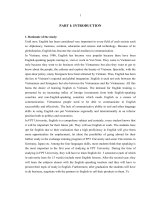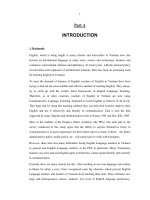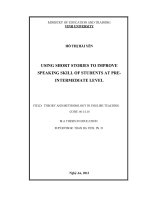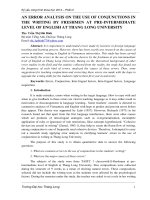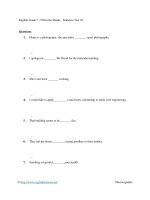Fill the blank pre intermediate level test 03
Bạn đang xem bản rút gọn của tài liệu. Xem và tải ngay bản đầy đủ của tài liệu tại đây (27.56 KB, 8 trang )
Fill the blank - Pre-Intermediate Level Test 03
Questions
1.
Dear Editor,
I went to Newzealand on a student programme last year and I'd like to (1)_______
you about it. It was very (2)_______ when I knew I was going to Newzealand
because I had never been there before. I didn't think about the problems of speaking
English (3)_______ I met my host family. At first I couldn't communicate with them
because my English was so bad. All the eight years I (4)_______ been learning wasn't
much use at all, (5)_______ we didn't have real practice at school. Even though my
grammar was good, my pronunciation wasn't. My problem is pronouncing "I" and "r".
For example, Newzealand people often asked "What do you eat in Thailand?" I
wanted to tell them that- we eat rice, but they didn't understand when I said "We eat
lice". My host mum helped me a lot by (6} my bad pronunciation. I usually practiced
by talking to myself when I had a shower, so no one could hear me. After four months
my English was (7)_______ better. Apart (8)_______ English I learn to make my
own breakfast and lunch. I had to ride a bicycle to school everyday. I went swimming
and ried water-skiing and sailing, (9)_______ was wonderful. But the most valuable
thing was that I learn to be (10)_______ myself and to be independent.
Kittiya Leelawipat, Commercial College, Bangkok, Thailand.
Number (1)
2.
A.
say
B.
tell
C.
talk
D.
speak
Dear Editor,
I went to Newzealand on a student programme last year and I'd like to (1)_______
you about it. It was very (2)_______ when I knew I was going to Newzealand
because I had never been there before. I didn't think about the problems of speaking
English (3)_______ I met my host family. At first I couldn't communicate with them
because my English was so bad. All the eight years I (4)_______ been learning wasn't
much use at all, (5)_______ we didn't have real practice at school. Even though my
©
Photocopiable
grammar was good, my pronunciation wasn't. My problem is pronouncing "I" and "r".
For example, Newzealand people often asked "What do you eat in Thailand?" I
wanted to tell them that- we eat rice, but they didn't understand when I said "We eat
lice". My host mum helped me a lot by (6} my bad pronunciation. I usually practiced
by talking to myself when I had a shower, so no one could hear me. After four months
my English was (7)_______ better. Apart (8)_______ English I learn to make my
own breakfast and lunch. I had to ride a bicycle to school everyday. I went swimming
and ried water-skiing and sailing, (9)_______ was wonderful. But the most valuable
thing was that I learn to be (10)_______ myself and to be independent.
Kittiya Leelawipat, Commercial College, Bangkok, Thailand.
Number (2)
3.
A.
exciting
B.
excites
C.
excited
D.
excite
Dear Editor,
I went to Newzealand on a student programme last year and I'd like to (1)_______
you about it. It was very (2)_______ when I knew I was going to Newzealand
because I had never been there before. I didn't think about the problems of speaking
English (3)_______ I met my host family. At first I couldn't communicate with them
because my English was so bad. All the eight years I (4)_______ been learning wasn't
much use at all, (5)_______ we didn't have real practice at school. Even though my
grammar was good, my pronunciation wasn't. My problem is pronouncing "I" and "r".
For example, Newzealand people often asked "What do you eat in Thailand?" I
wanted to tell them that- we eat rice, but they didn't understand when I said "We eat
lice". My host mum helped me a lot by (6} my bad pronunciation. I usually practiced
by talking to myself when I had a shower, so no one could hear me. After four months
my English was (7)_______ better. Apart (8)_______ English I learn to make my
own breakfast and lunch. I had to ride a bicycle to school everyday. I went swimming
and ried water-skiing and sailing, (9)_______ was wonderful. But the most valuable
thing was that I learn to be (10)_______ myself and to be independent.
Kittiya Leelawipat, Commercial College, Bangkok, Thailand.
©
Photocopiable
Number (3)
4.
A.
after
B.
until
C.
when
D.
while
Dear Editor,
I went to Newzealand on a student programme last year and I'd like to (1)_______
you about it. It was very (2)_______ when I knew I was going to Newzealand
because I had never been there before. I didn't think about the problems of speaking
English (3)_______ I met my host family. At first I couldn't communicate with them
because my English was so bad. All the eight years I (4)_______ been learning wasn't
much use at all, (5)_______ we didn't have real practice at school. Even though my
grammar was good, my pronunciation wasn't. My problem is pronouncing "I" and "r".
For example, Newzealand people often asked "What do you eat in Thailand?" I
wanted to tell them that- we eat rice, but they didn't understand when I said "We eat
lice". My host mum helped me a lot by (6} my bad pronunciation. I usually practiced
by talking to myself when I had a shower, so no one could hear me. After four months
my English was (7)_______ better. Apart (8)_______ English I learn to make my
own breakfast and lunch. I had to ride a bicycle to school everyday. I went swimming
and ried water-skiing and sailing, (9)_______ was wonderful. But the most valuable
thing was that I learn to be (10)_______ myself and to be independent.
Kittiya Leelawipat, Commercial College, Bangkok, Thailand.
Number (4)
A.
had
B.
have
C.
has
D.
having
©
Photocopiable
5.
Dear Editor,
I went to Newzealand on a student programme last year and I'd like to (1)_______
you about it. It was very (2)_______ when I knew I was going to Newzealand
because I had never been there before. I didn't think about the problems of speaking
English (3)_______ I met my host family. At first I couldn't communicate with them
because my English was so bad. All the eight years I (4)_______ been learning wasn't
much use at all, (5)_______ we didn't have real practice at school. Even though my
grammar was good, my pronunciation wasn't. My problem is pronouncing "I" and "r".
For example, Newzealand people often asked "What do you eat in Thailand?" I
wanted to tell them that- we eat rice, but they didn't understand when I said "We eat
lice". My host mum helped me a lot by (6} my bad pronunciation. I usually practiced
by talking to myself when I had a shower, so no one could hear me. After four months
my English was (7)_______ better. Apart (8)_______ English I learn to make my
own breakfast and lunch. I had to ride a bicycle to school everyday. I went swimming
and ried water-skiing and sailing, (9)_______ was wonderful. But the most valuable
thing was that I learn to be (10)_______ myself and to be independent.
Kittiya Leelawipat, Commercial College, Bangkok, Thailand.
Number (5)
6.
A.
although
B.
even
C.
because
D.
so
Dear Editor,
I went to Newzealand on a student programme last year and I'd like to (1)_______
you about it. It was very (2)_______ when I knew I was going to Newzealand
because I had never been there before. I didn't think about the problems of speaking
English (3)_______ I met my host family. At first I couldn't communicate with them
because my English was so bad. All the eight years I (4)_______ been learning wasn't
much use at all, (5)_______ we didn't have real practice at school. Even though my
grammar was good, my pronunciation wasn't. My problem is pronouncing "I" and "r".
For example, Newzealand people often asked "What do you eat in Thailand?" I
wanted to tell them that- we eat rice, but they didn't understand when I said "We eat
lice". My host mum helped me a lot by (6} my bad pronunciation. I usually practiced
by talking to myself when I had a shower, so no one could hear me. After four months
©
Photocopiable
my English was (7)_______ better. Apart (8)_______ English I learn to make my
own breakfast and lunch. I had to ride a bicycle to school everyday. I went swimming
and ried water-skiing and sailing, (9)_______ was wonderful. But the most valuable
thing was that I learn to be (10)_______ myself and to be independent.
Kittiya Leelawipat, Commercial College, Bangkok, Thailand.
Number (6)
7.
A.
to correct
B.
correct
C.
corrects
D.
correcting
Dear Editor,
I went to Newzealand on a student programme last year and I'd like to (1)_______
you about it. It was very (2)_______ when I knew I was going to Newzealand
because I had never been there before. I didn't think about the problems of speaking
English (3)_______ I met my host family. At first I couldn't communicate with them
because my English was so bad. All the eight years I (4)_______ been learning wasn't
much use at all, (5)_______ we didn't have real practice at school. Even though my
grammar was good, my pronunciation wasn't. My problem is pronouncing "I" and "r".
For example, Newzealand people often asked "What do you eat in Thailand?" I
wanted to tell them that- we eat rice, but they didn't understand when I said "We eat
lice". My host mum helped me a lot by (6} my bad pronunciation. I usually practiced
by talking to myself when I had a shower, so no one could hear me. After four months
my English was (7)_______ better. Apart (8)_______ English I learn to make my
own breakfast and lunch. I had to ride a bicycle to school everyday. I went swimming
and ried water-skiing and sailing, (9)_______ was wonderful. But the most valuable
thing was that I learn to be (10)_______ myself and to be independent.
Kittiya Leelawipat, Commercial College, Bangkok, Thailand.
Number (7)
A.
more
B.
many
©
Photocopiable
8.
C.
much
D.
a lot of
Dear Editor,
I went to Newzealand on a student programme last year and I'd like to (1)_______
you about it. It was very (2)_______ when I knew I was going to Newzealand
because I had never been there before. I didn't think about the problems of speaking
English (3)_______ I met my host family. At first I couldn't communicate with them
because my English was so bad. All the eight years I (4)_______ been learning wasn't
much use at all, (5)_______ we didn't have real practice at school. Even though my
grammar was good, my pronunciation wasn't. My problem is pronouncing "I" and "r".
For example, Newzealand people often asked "What do you eat in Thailand?" I
wanted to tell them that- we eat rice, but they didn't understand when I said "We eat
lice". My host mum helped me a lot by (6} my bad pronunciation. I usually practiced
by talking to myself when I had a shower, so no one could hear me. After four months
my English was (7)_______ better. Apart (8)_______ English I learn to make my
own breakfast and lunch. I had to ride a bicycle to school everyday. I went swimming
and ried water-skiing and sailing, (9)_______ was wonderful. But the most valuable
thing was that I learn to be (10)_______ myself and to be independent.
Kittiya Leelawipat, Commercial College, Bangkok, Thailand.
Number (8)
9.
A.
from
B.
with
C.
for
D.
to
Dear Editor,
I went to Newzealand on a student programme last year and I'd like to (1)_______
you about it. It was very (2)_______ when I knew I was going to Newzealand
because I had never been there before. I didn't think about the problems of speaking
English (3)_______ I met my host family. At first I couldn't communicate with them
©
Photocopiable
because my English was so bad. All the eight years I (4)_______ been learning wasn't
much use at all, (5)_______ we didn't have real practice at school. Even though my
grammar was good, my pronunciation wasn't. My problem is pronouncing "I" and "r".
For example, Newzealand people often asked "What do you eat in Thailand?" I
wanted to tell them that- we eat rice, but they didn't understand when I said "We eat
lice". My host mum helped me a lot by (6} my bad pronunciation. I usually practiced
by talking to myself when I had a shower, so no one could hear me. After four months
my English was (7)_______ better. Apart (8)_______ English I learn to make my
own breakfast and lunch. I had to ride a bicycle to school everyday. I went swimming
and ried water-skiing and sailing, (9)_______ was wonderful. But the most valuable
thing was that I learn to be (10)_______ myself and to be independent.
Kittiya Leelawipat, Commercial College, Bangkok, Thailand.
Number (9)
A.
where
B.
which
C.
who
D.
what
10. Dear Editor,
I went to Newzealand on a student programme last year and I'd like to (1)_______
you about it. It was very (2)_______ when I knew I was going to Newzealand
because I had never been there before. I didn't think about the problems of speaking
English (3)_______ I met my host family. At first I couldn't communicate with them
because my English was so bad. All the eight years I (4)_______ been learning wasn't
much use at all, (5)_______ we didn't have real practice at school. Even though my
grammar was good, my pronunciation wasn't. My problem is pronouncing "I" and "r".
For example, Newzealand people often asked "What do you eat in Thailand?" I
wanted to tell them that- we eat rice, but they didn't understand when I said "We eat
lice". My host mum helped me a lot by (6} my bad pronunciation. I usually practiced
by talking to myself when I had a shower, so no one could hear me. After four months
my English was (7)_______ better. Apart (8)_______ English I learn to make my
own breakfast and lunch. I had to ride a bicycle to school everyday. I went swimming
and ried water-skiing and sailing, (9)_______ was wonderful. But the most valuable
thing was that I learn to be (10)_______ myself and to be independent.
Kittiya Leelawipat, Commercial College, Bangkok, Thailand.
©
Photocopiable
Number (10)
A.
with
B.
on
C.
to
D.
by
©
Photocopiable

